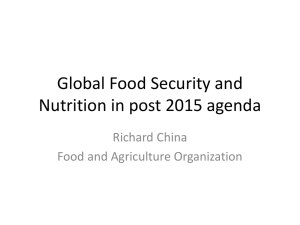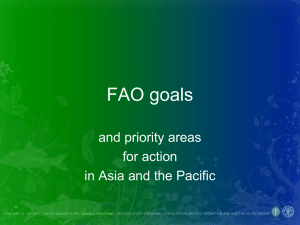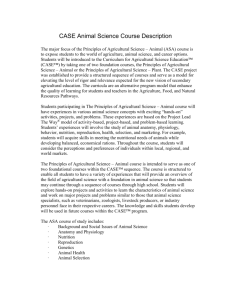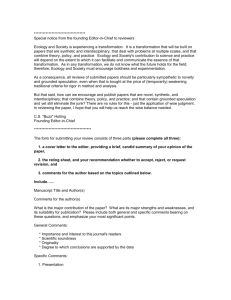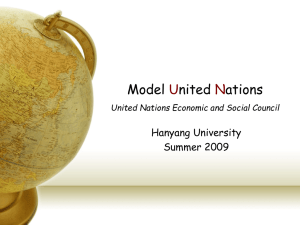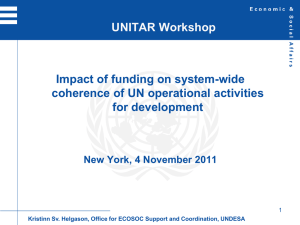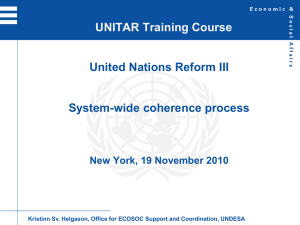BODY: - IDSA
advertisement
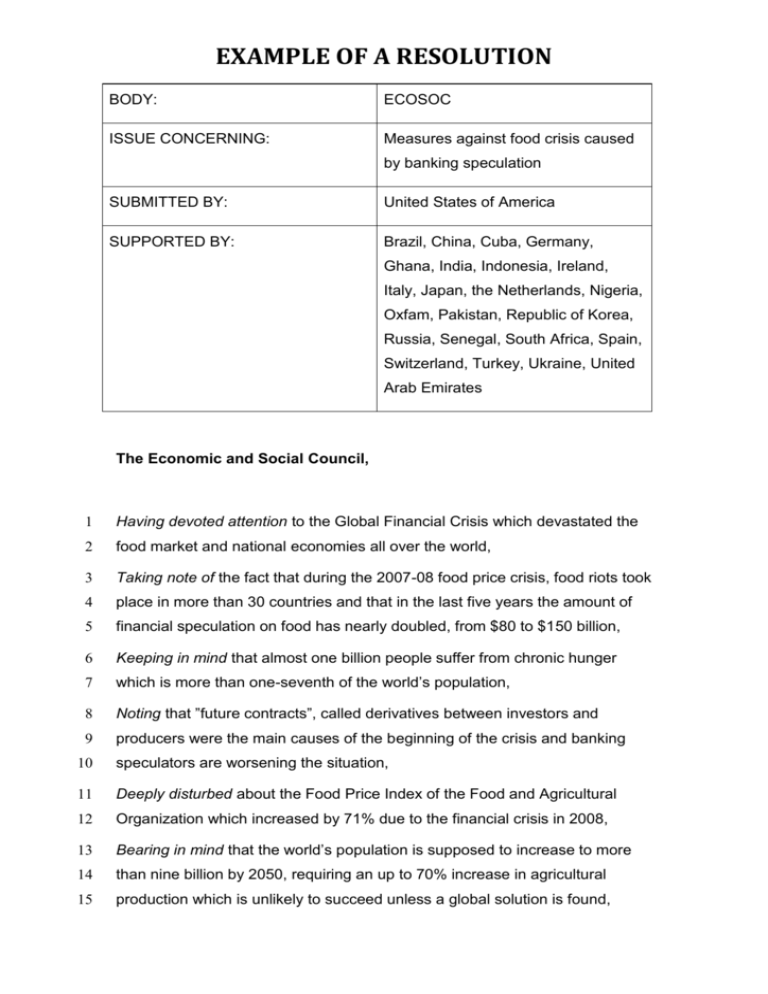
EXAMPLE OF A RESOLUTION BODY: ECOSOC ISSUE CONCERNING: Measures against food crisis caused by banking speculation SUBMITTED BY: United States of America SUPPORTED BY: Brazil, China, Cuba, Germany, Ghana, India, Indonesia, Ireland, Italy, Japan, the Netherlands, Nigeria, Oxfam, Pakistan, Republic of Korea, Russia, Senegal, South Africa, Spain, Switzerland, Turkey, Ukraine, United Arab Emirates The Economic and Social Council, 1 Having devoted attention to the Global Financial Crisis which devastated the 2 food market and national economies all over the world, 3 Taking note of the fact that during the 2007-08 food price crisis, food riots took 4 place in more than 30 countries and that in the last five years the amount of 5 financial speculation on food has nearly doubled, from $80 to $150 billion, 6 Keeping in mind that almost one billion people suffer from chronic hunger 7 which is more than one-seventh of the world’s population, 8 Noting that ”future contracts”, called derivatives between investors and 9 producers were the main causes of the beginning of the crisis and banking 10 speculators are worsening the situation, 11 Deeply disturbed about the Food Price Index of the Food and Agricultural 12 Organization which increased by 71% due to the financial crisis in 2008, 13 Bearing in mind that the world’s population is supposed to increase to more 14 than nine billion by 2050, requiring an up to 70% increase in agricultural 15 production which is unlikely to succeed unless a global solution is found, EXAMPLE OF A RESOLUTION 16 Welcoming acts taken concerning this issue, such as the food and 17 development assistance by the U.S. Government of 1.7 billion dollars for 18 humanitarian needs and agricultural productivity, the food package for eleven 19 million people from the Canadian International Development Agency to East 20 Africa in times of drought and the Chinese Goverment’s famine relief of more 21 than $70 million dollars for suffering African countries, 22 Fully alarmed by the fact that $4.4 trillion of over-the-counter commodity 23 derivatives were outstanding in December 2008 after having been created in 24 private so that other market investors would not see what assets were being 25 traded at what price, 26 Conscious of the need to support the ongoing economic growth which is a 27 must in order to effectuate employment, to promote national and international 28 development and to consolidate social integrity, 29 Approving the Food Stamp Program created by the United States 30 Government in 1934 to provide food to people with lower income, 31 Affirming that the reason for the crisis is not only food but also other energy 32 sources such as oil, 33 Welcoming the work of the World Development Movement to set up position 34 limits for the commodity derivatives in order to prevent speculation, distorting 35 prices and contribution to future food crises, 36 Expresses its regret towards the fact that poor households in developing 37 countries tend to spend between 50% and 90% of their income on food, 38 compared to an average of 10% to 15% in developed countries, 39 Recalling the Global Jobs Pact, adopted by the International Labor 40 Conference on 19 June 2009, which intended to promote a job-intensive 41 recovery from the crisis and sustainable growth, 42 Recalling also previous UN resolutions on – at least partly – this topic such as 43 ECOSOC’s 2009/5 resolution, which was adopted after the International 44 Labor Conference of the International Labor Organization and which 45 strengthens the Global Jobs Pact framework, 46 Guided by the ECOSOC resolution 2010/25, which takes the Global Jobs 47 Pact as a general framework for countries, encourages them to make a full EXAMPLE OF A RESOLUTION 48 use of it and raises awareness to promoting funding and fiscal support for less 49 developed countries in order to help them in the implementation of the policy 50 options and recommendations mentioned in the Global Jobs Pact, 51 Pointing at the UN resolution A/RES/63/205, which calls the attention to the 52 importance of considering the issue of the international financial system and 53 development, 54 Reminding every nation of the GA resolution A/RES/63/303, which addresses 55 the social and human impacts of the crisis, such as but not limited to the 56 increase in unemployment, hunger and infant and maternal mortality, 57 Referring to the GA’s resolution A/RES/63/277, which has convened a United 58 Nations conference regarding the world financial and economic crisis, 59 requested a report by the Secretary General on the analytical work of the 60 United Nations and the causes of the present crisis, invited the president of 61 the ECOSOC to this conference in order to involve the United Nations 62 Conference on Trade and Development as well as the special high-level 63 meeting of the ECOSOC in 2009 and furthermore supported an official 64 summary document of this conference proposing solutions to the crisis, 65 1. Calls upon governments to urge their private investors and banks to 66 regulate speculation in future markets in order to prevent citizens from 67 becoming dependent on social welfare; 68 2. Calls upon all nations to take collective measures against organizations 69 they see responsible for banking speculation, as long as they refuse to 70 accept the negative effects on the farmers involved and the measures 71 are such as follow but not limited to these: 72 a. Boycott on their services, 73 b. Counter-campaign against their enterprise, 74 c. Financing the corporate rivals of the speculating companies as a 75 last resort only if other measures within the resolution are not 76 effective, 77 3. Asks international relief organizations like the WHO or the FAO to 78 support a newly founded council for financial and non-financial aid to 79 people suffering from the Great Hunger with: EXAMPLE OF A RESOLUTION 80 81 82 a. the name of Financing Against Malnutrition InterNational Establishment (FAMINE), b. the financial support from the G20 countries and those that are 83 willing to cooperate and help in these inevitable humanitarian 84 crises, 85 c. the aim of establishing an international system that will allow us 86 to keep banking speculation limited and regulated by monitoring 87 and controlling, 88 89 90 d. an annual report to the ECOSOC which contains: i. the recent financial status handed in by the national bank of each country within FAMINE, 91 ii. the taken measures mentioned in operative clause two, 92 iii. the amount of money spent on these acts, 93 iv. the number of children taking part in the U.S. 94 government-supported nutrition program or similar 95 programs by other members of the UN, 96 97 v. a profit and loss account handed in by the president of the summit, 98 vi. a cash flow statement and a balance sheet, 99 vii. every country’s submission listing the possible risk factors 100 101 102 103 104 of the process of our organization, viii. all the previous points and is handed in every January; e. members of every ministry of finance from the participating countries, and NGO’s representatives, f. a summit every six months in its headquarter, located in the 105 United States of America, Washington D.C., where the recent 106 activities concerning these issues are debated, 107 108 g. a leadership with a rotational system every six months in the order of the 2012 GDP rankings; EXAMPLE OF A RESOLUTION 109 4. Further requests every country to revise and if needed modify their 110 laws and rules concerning their policy on protecting job security and 111 employee’s rights, with the international community thereby coming 112 closer to a mutually accepted solution that will guarantee welfare and a 113 secure life of every citizen; 114 5. Supports to convene a conference among the G20 on the issue of the 115 food crisis to expand the activities of the Global Agricultural and Food 116 Security Program (GAFSP) in order to aid targeted countries to make 117 permanent improvements with the developing investments in food and 118 agriculture; 119 120 121 6. Recommends every country to increase their expenditure in the agricultural sector from the national budget by 5%; 7. Asks the World Health Organization (WHO) and the World Bank Group 122 (WBG) to foster activities of both the Global Agriculture and Food 123 Security Program and the FAMINE both financially and medically by: 124 a. investing into the agriculture of LEDCs with the most 125 impoverished situation, 126 b. improving social protection, 127 c. ameliorating hygienic and medical circumstances, 128 d. developing a possible effectuation of child nutrition which is a 129 fundamental and very complex problem of the food crisis; 130 131 8. Suggests every nation’s possible solutions to bettering irrigation in LEDCs in order to increase production; 132 9. Expresses its appreciation towards the work of the Agricultural Market 133 Information System (AMIS) on the market monitoring system thus 134 enhancing market transparency and supporting the partnership 135 between the ECOSOC and the AMIS in order to help the governments 136 in verifying the current national economic situations through the 137 monitoring system mentioned above and responding to global food 138 price peaks fast and efficiently; 139 140 10. Expresses its sympathy towards the work of Scaling Up Nutrition (SUN) which addresses maternal and child nutrition, and further EXAMPLE OF A RESOLUTION 141 requests the engagement of further stakeholders in order to have them 142 in more fields of the current issue since the partnership to the private 143 sector is a potential possible solution; 144 11. Calls the attention to Millennium Development Goal 1 (MDG1) whose 145 task is to eradicate extreme poverty and hunger and to support this 146 process by maintaining a mutual database on nutrition thereby 147 enabling countries to observe all actions taken, since there are only 148 three years until the deadline of the Millennium Development Goals; 149 12. Decides to remain actively seized on the matter.

